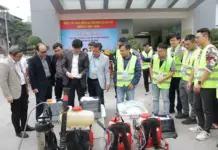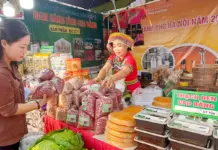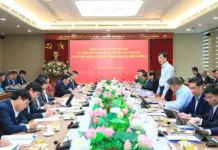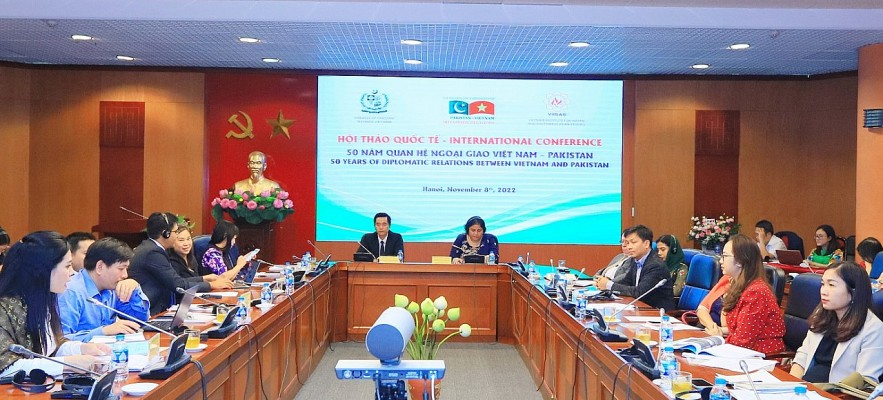 |
| At the event. (Photo: Hung Anh) |
Trade turnover is not commensurate with the potential
On November 8, within the framework of the international conference on the 50th anniversary of diplomatic relations between Vietnam and Pakistan, the Pakistani Embassy to Vietnam cooperated with the Institute for Indian and Southwest Asian Studies under the Vietnam Academy of Social Sciences to hold a discussion on opportunities to promote trade and investment between Vietnam and Pakistan.
At the session, Le Thi Mai Anh from the Asia-Africa Market Department, Ministry of Industry and Trade said Pakistan is one of Vietnam’s three most significant trading partners in South Asia (along with India and Bangladesh), and one of two markets in South Asia where Vietnam has a trade representative office.
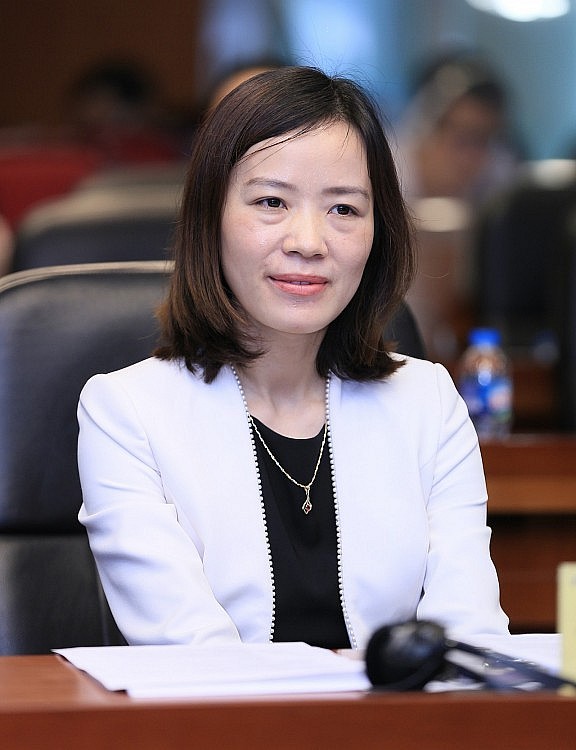 |
| Le Thi Mai Anh from the Asia-Africa Market Department, Ministry of Industry and Trade. (Photo: Hung Anh) |
Both countries’ economies complement each other, leaving room for cooperation. Pakistan provides raw materials for many important manufacturing industries of Vietnam such as textile materials, footwear materials, and high-value seafood. Meanwhile, Vietnam’s important exports to Pakistan include tea, pepper, pangasius, rubber, textile fibers, iron and steel, and industrial machinery. From 2015 to 2021, Vietnam-Pakistan’s import-export turnover increased from USD$579.9 million to USD$794.1 million, an increase of 54.4%.
However, the two countries’ trade turnover is not commensurate with their potential due to many reasons. Firstly, Pakistan’s import tax for Vietnamese goods is relatively high because there is no bilateral trade agreement on tariff preferences between the two countries. Particularly, the tax rate for pepper is 3%, tea 11%, basa fish and other aquatic products 20%.
Secondly, Pakistan requires a Halal certificate for all imported food items. However, Vietnamese enterprises do not have access to much information about Halal standards and do not understand the certification registration process. Therefore, they face difficulties in accessing the Pakistani market.
Thirdly, Vietnamese enterprises encounter policy barriers from Pakistan. For example, in May 2022, Pakistan banned the import of luxury and non-essential goods, many of which include goods that Vietnam wanted to boost exports to Pakistan.
Fourth, businesses from both countries lack understanding of each other’s market and business culture. Therefore, the two sides have to conduct many negotiations, leading to a longer waiting time. Other than that, businesses have to face other problems such as no direct flights, and high delivery costs.
Aiming to reach US$ 1 billion in trade turnover in 2022
To promote trade cooperation between Vietnam and Pakistan, Le Thi Mai Anh recommended Vietnam and Pakistan create favorable conditions for businesses to survey the market and strengthen trade promotion activities. Vietnam and Pakistan also need to come up with an appropriate import tax policy to increase the competitiveness of the two countries’ goods. The two countries need to facilitate payment activities, thereby creating conditions to promote trade.
According to Umer Kamal, Ministry of Commerce, Pakistan, to promote trade to the Pakistani market, Vietnam needs to diversify its export products and promote its strengths in agricultural products, fiber, yarn, iron, steel, industrial machinery, and machine components.
In addition, the functional agencies of the two sides need to cooperate with the two embassies to strengthen the presence of Vietnamese businesses in Pakistan through activities such as trade promotion, sending business delegation to participate in exhibitions and fairs in Pakistan.
Truong Thi Bich Ngoc, Deputy Head of International Relations Department, Vietnam Confederation of Commerce and Industry (VCCI), recommended the two governments review and exchange information regularly with relevant agencies and businesses to solve existing problems. It is necessary to have solutions for tax policy, and trade promotion agreements. They need to promote technology and e-commerce platforms application to overcome difficulties of geographical distance.
According to Ngoc, it is necessary to promote the role of the Vietnam – Pakistan Intergovernmental Committee and other bilateral cooperation mechanisms in promoting bilateral trade. It is necessary to include Halal-relating discussion in the upcoming meeting of the committee, thereby enhancing the exchange between Vietnam and Pakistan on Halal certification, which is the basis for Vietnamese products to enter Pakistani market. It is necessary to promote the role of embassies, trade offices, ministries and agencies of the two countries in trade promotion, creating opportunities for businesses to meet and exchange information, thereby opening up new opportunities
Truong Thi Bich Ngoc said VCCI is ready to cooperate with the embassy and related agencies to support businesses of the two sides to cooperate and develop, towards the goal of earning US$ 1 billion in Vietnam-Pakistan trade turnover.






